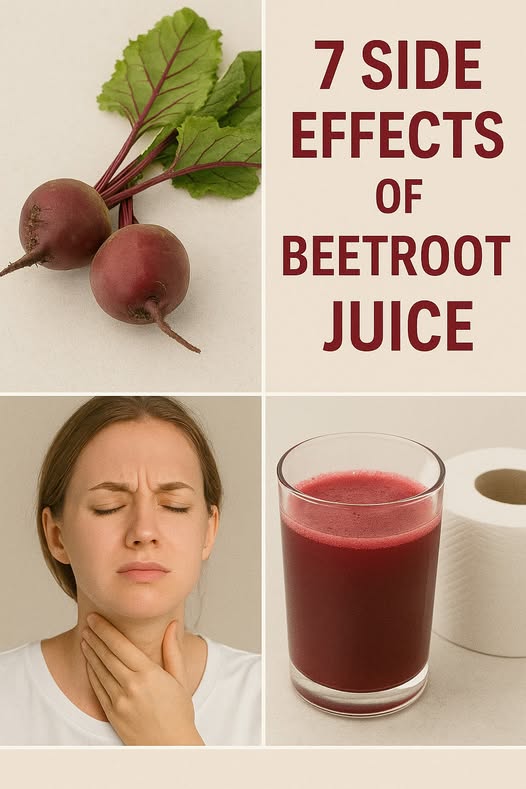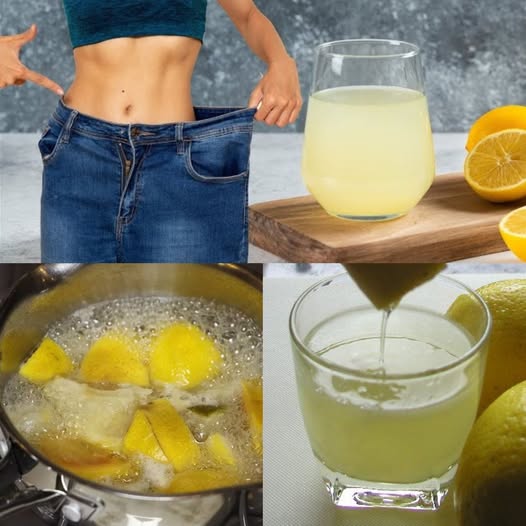Introduction:

Beetroot juice has rapidly gained popularity as a “superfood elixir,” known for its detoxifying properties, energy-boosting effects, and cardiovascular support. With athletes swearing by its performance-enhancing capabilities and wellness influencers praising its skin-glowing benefits, it’s easy to assume this vibrant red juice is all gain and no pain.
But here’s the truth no one’s talking about: beetroot juice can cause side effects—and some of them may surprise you. While it remains a valuable part of a balanced diet for many, ignoring its potential drawbacks could lead to discomfort or even serious health issues.
In this article, we uncover the 7 side effects of beetroot juice you must know before making it your daily habit. We’ll answer frequently asked questions, highlight who should be cautious, and offer smart strategies to safely enjoy beetroot juice without the unwanted surprises.
Let’s get into the details—because your health deserves clarity, not confusion.
1. Beeturia: Red or Pink Urine That Might Scare You
What is it?
Beeturia is the medical term for passing red or pink urine after consuming beetroot juice. It’s generally harmless—but undeniably alarming if you’re not expecting it.
Why does it happen?
Beets are rich in betalain pigments, which some people don’t fully break down during digestion. As a result, the red coloration passes through the system and out in the urine or stool.
Is it dangerous?
Not usually. However, in rare cases, beeturia may signal iron deficiency or malabsorption issues, especially if accompanied by fatigue or pale skin.
Actionable Tip:
If beeturia occurs frequently and you experience additional symptoms, consider getting a full blood panel to rule out underlying conditions.
2. Kidney Stones Risk: High Oxalate Content Is the Culprit
Why it matters:
Beetroot juice is high in oxalates—naturally occurring compounds that can lead to kidney stone formation in susceptible individuals.
According to the National Kidney Foundation, oxalate-rich foods like beets can crystallize with calcium in the kidneys, leading to painful calcium oxalate stones, which account for up to 80% of all kidney stones.
Who’s at risk?
- Individuals with a history of kidney stones
- People with low calcium intake
- Those on high-protein diets
Preventive Measures:
- Limit beetroot juice to 2-3 times per week if you’re prone to kidney stones
- Pair with calcium-rich foods to help bind oxalates in the gut instead of the kidneys
- Stay hydrated to flush excess oxalates
3. Low Blood Pressure (Hypotension): A Double-Edged Sword
The good news:
Beetroot juice contains nitrates, which convert into nitric oxide—a compound known for relaxing blood vessels and lowering blood pressure.
The downside:
For those already on antihypertensive medication or who naturally have low blood pressure, beet juice can push levels dangerously low, causing dizziness, fainting, or fatigue.
Real stats:
A 2015 study published in Hypertension found that beet juice lowered systolic blood pressure by 4–10 mm Hg within hours of consumption.
Be cautious if you experience:
- Lightheadedness after drinking
- Cold extremities
- Fatigue or blurred vision
Smart Strategy:
Monitor your blood pressure regularly if drinking beetroot juice frequently. Consult your physician before combining it with BP medications.
4. Gastrointestinal Issues: Bloating, Gas, and Upset Stomach
Common complaint:
While beetroot is rich in fiber, beetroot juice—being concentrated—can sometimes lead to digestive discomfort, especially when consumed on an empty stomach.
Symptoms include:
- Bloating
- Gas
- Cramping
- Diarrhea (in sensitive individuals)
What causes it?
The juice contains fermentable sugars and fibers that can feed gut bacteria, producing gas. It’s also high in FODMAPs, which can irritate those with IBS.
Solution:
- Start with small servings (1/4 cup) and increase gradually
- Mix with other digestive-friendly juices like cucumber or celery
- Drink it after a meal, not on an empty stomach
5. Allergic Reactions: Rare but Possible
Though uncommon, some individuals experience allergic symptoms after drinking beetroot juice. These reactions are typically mild but can occasionally become serious.
Signs to watch out for:
- Skin rashes or itching
- Hives
- Chills or fever
- Throat tightness or difficulty breathing
Who is more likely to react?
- Individuals with known food sensitivities
- People prone to histamine reactions
- Children under 12
Immediate Action:
Discontinue use at the first sign of a reaction. Seek medical attention if symptoms escalate.
6. Colored Stools: Mistaken for Internal Bleeding
Beetroot juice can color your stools deep red or dark maroon, which many people mistake for blood—a symptom that normally triggers panic.
What’s going on?
Betalain pigments pass through the digestive tract largely intact, especially when consumed in juice form. This can turn stools dramatic shades of red.
How to differentiate:
- If there are no other symptoms (like pain, fatigue, or fever), it’s likely beet-related
- Symptoms accompanied by dark, tarry stool could point to GI bleeding—seek medical help
Tip:
Keep track of when you consume beetroot juice. If the discoloration disappears within 24–48 hours, it’s probably harmless.
7. Blood Sugar Spikes: A Hidden Risk for Diabetics
Beetroot juice may seem healthy, but it has a moderate glycemic index (61) and contains natural sugars, which can raise blood glucose levels when consumed in excess.
Why it’s concerning:
In juice form, fiber is stripped out—this means faster sugar absorption. For diabetics or those with insulin resistance, this can cause post-meal spikes.
Smart consumption for diabetics:
- Stick to ½ cup servings or less
- Mix with lemon juice or add fiber (chia seeds or psyllium husk)
- Monitor blood sugar levels closely after drinking
Frequently Asked Questions (FAQs)
Is it OK to drink beetroot juice every day?
Yes, but with caution. For most people, ½ to 1 cup per day is safe. However, if you have low blood pressure, kidney issues, or are diabetic, it’s best to limit intake and consult a healthcare professional.
What’s the best time to drink beetroot juice?
Morning is ideal to take advantage of its energy-boosting effects. If you’re drinking it for workout performance, consume it 1–2 hours before exercise.
Can I mix beetroot juice with other juices?
Absolutely. Combining it with carrot, apple, ginger, or lemon not only enhances flavor but can also balance sugar levels and digestive response.
Who should avoid beetroot juice entirely?
- People with a history of kidney stones
- Those taking blood pressure-lowering medications
- Individuals with known oxalate sensitivity
- Diabetics without blood sugar management plans
Conclusion: Know the Risks Before You Sip
Beetroot juice is undeniably powerful—with benefits that range from improved athletic performance to better blood pressure control and enhanced detoxification. But just like any potent health elixir, it comes with risks you can’t afford to ignore.
From beeturia and kidney stone formation to blood pressure drops and allergic reactions, the side effects of beetroot juice are real and worth understanding. That doesn’t mean you need to eliminate it from your diet—but it does mean you need to drink smart.


